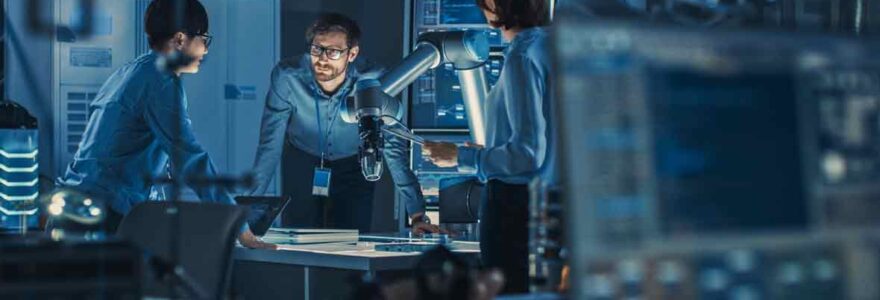Peering into the fascinating realm of robotic technologies, one can't help but marvel at the sheer innovation on display. Pioneering advancements have altered the landscape of industries far and wide, with manufacturing sectors seeing a transformative impact. Business development solutions have been redefined with the advent of these innovations, reshaping the digital and data-driven world in the process. Robots have started to play significant roles in production, enhancing automation and efficiency, while robotic sensors and intelligence have begun to pave the path toward autonomous systems. Even fields as diverse as healthcare and space exploration have felt the influence of robotic applications, presenting both challenges and potentials. As we delve into these captivating advancements, we will touch upon the opportunities, the hurdles, and the potential of autonomous robotics in advanced healthcare and space research.
Advanced Robotic Technologies Transforming Industries
Striking advancements in robotic technologies have ushered in a new era of industrial transformation. In this digital age, advanced robotics have become an integral part of various industries, proving to be a game changer in business development.
Impact of Robotic Innovation in Manufacturing
Revolutionizing the manufacturing industry, robotic technologies have enabled companies to enhance efficiency and productivity. The benefits of incorporating robots in manufacturing processes are numerous, from streamlining operations to reducing human errors. Advanced robotic tech has indeed opened up new opportunities for industrial growth.
Role of Robotics in Business Development Solutions
The role of robotics in business development is becoming increasingly significant. Companies are leveraging advanced robotics to automate complex processes, thereby driving business growth. As a result, robotics has emerged as a vital tool for creating innovative business development solutions.
Robotics in the Digital and Data-driven World
In today's digital and data-driven world, robotics is playing a pivotal role. Advanced robotics technologies are facilitating the collection and analysis of vast amounts of data, leading to more informed decision making in industries. The application of such tech is proving instrumental in driving industrial innovation.
Automation and Efficiency: The Significant Role of Robots in Production
The advent of robotic technologies has triggered a paradigm shift in production industries. Automation, a pioneering approach, has demonstrated its ability to boost productivity and minimize errors, thereby redefining the landscape of employment in manufacturing sectors. Robots, with their unparalleled precision and speed, undertake an array of tasks, thereby enhancing efficiency and streamlining production systems. A wide range of robots, each with unique capabilities, have been integrated into production lines. However, their implementation is not without challenges, including ethical concerns and the need for specialized skills to manage these automated systems. Despite these issues, one cannot overlook the positive impacts of automation on the economy and environment. Robotic technologies have been found to have a significant influence on product quality, which in turn, has resulted in a commendable return on investment. Studies have been conducted to validate these claims, providing evidence of the benefits of incorporating automation into production processes. The future of automation and robotics in production appears promising, with evolving trends that indicate an increase in their utilization. For more insights, follow this link to learn about how robotic technology is revolutionizing production chains.
Robotic Sensors and Intelligence: Paving the Way for Autonomous Systems
Conventional robotic systems, although functionally effective, often lack the precision and efficiency that sensor-equipped counterparts offer. The integration of sensors and intelligence in autonomous systems has a profound impact, driving significant advancements in several industries. Factual data supports this claim. As an illustration, a table below provides a comparison between conventional and sensor-equipped robotic systems in terms of performance and efficiency.
Despite the evident potential, the field of robotic sensors and intelligence encounters several challenges and limitations. Yet, the continuous technological advancements promise to overcome these hurdles. Insights from renowned academicians and experts validate the transformative power of intelligent sensors and artificial intelligence in autonomous robotic systems.
Market penetration of these technologies, spearheaded by top players and their flagship products, further signifies the growth and acceptance of these solutions. A holistic view of the ethical and social implications of using autonomous robots equipped with sensors and intelligence is equally vital. Staying abreast of the upcoming events, conferences, or webinars related to robotic sensors and intelligence can provide a deeper understanding of this rapidly progressing field.
Challenges and Potential of Robotic Applications in Healthcare and Space Exploration
Emerging as a pioneering innovation, robotics has a colossal potential to revolutionize various sectors, notably healthcare and space exploration. The technology enables enhancement of healthcare services by executing repetitive tasks, thus conserving valuable human resources and time. Similarly, the realm of space exploration is witnessing transformative changes with the integration of robotic applications.
Robotic Innovations in Healthcare: Opportunities and Challenges
Robotic technology in healthcare presents an array of possibilities. Robots, built with the latest technological advancements, are capable of performing surgical procedures with precision beyond human capabilities. However, there exist real challenges concerning their ethical and secure utilization. Setting up comprehensive regulations and standards is a pressing need to ensure the safe and ethical use of robots. Furthermore, the costs associated with integrating robotics into healthcare services are substantial, necessitating strategic financial planning.
Robotic Technology in Space Exploration: A New Frontier
Space research is experiencing a paradigm shift with the advent of autonomous robotics. Robotic rovers, for instance, have greatly facilitated and secured space exploration. Yet, this field faces its own set of challenges, like the need for robust logistics to support these advanced technologies. While robotics' potential is immense, the implications on human employment in this sector require closer scrutiny.
Potential of Autonomous Robotics in Advanced Healthcare and Space Research
Robotic applications present a viable solution to healthcare's perennial issue of staff shortages, and the logistic hurdles in space exploration. With continuous innovations, it is expected that robotics will further reshape the future of these industries. However, the advantages of robotics do not overshadow the drawbacks of automation. Hence, a balanced approach is essential to fully exploit the potential of robotics in these sectors.
